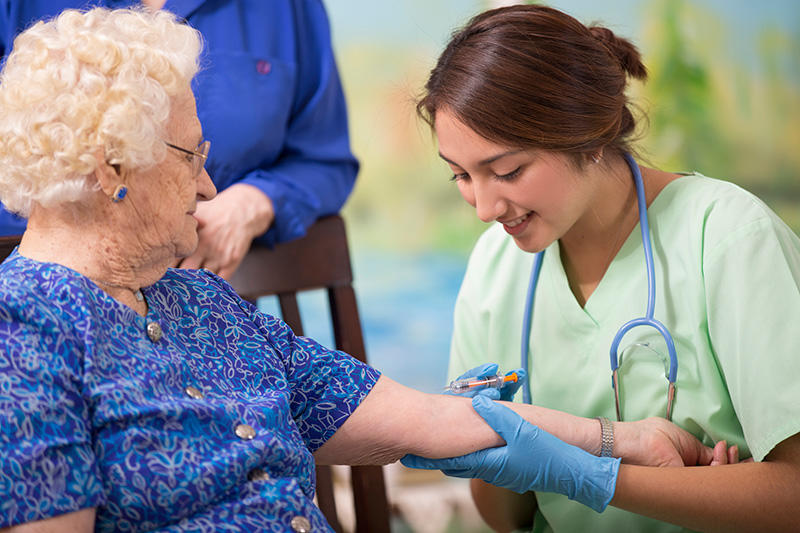Featured
Tags
Share

At a time when healthcare professionals are needed more than ever, you may be interested in earning a Master of Science in Nursing (MSN) degree online. With an advanced nursing degree, you have the opportunity to broaden your career prospects and, considering the current high demand, choose the work setting and hours that you prefer.
While there are different career paths you can pursue with an online master’s in nursing degree, an Adult-Gerontology Nurse Practitioner (AGNP) specialty track is one that may stand out for nurses who want to make a difference in healthcare. According to the U.S. Bureau of Labor Statistics (BLS), employment of nurse practitioners (NPs) and those in similar roles is projected to grow 38% by 2032, which is much faster than the average for all occupations.1
What Is Nurse Practitioner Gerontology?
An adult-gerontology nurse practitioner is an advanced practice registered nurse (APRN) who manages the healthcare needs of patients from adolescence to older adulthood. AGNPs are specially trained to help address the physical, mental and social effects of aging. Depending on their specialty, AGNPs may work in Adult-Gerontology Acute Care or Primary Care. Gerontology NPs can prescribe medication, conduct tests and create full treatment plans.
Acute Care AGNP vs. Primary Care: What’s the Difference?
An adult-gerontology acute care nurse practitioner provides care to patients who are critically ill, highly vulnerable to complications or physiologically unstable. They diagnose and treat a variety of health conditions and create personalized treatment plans. Primary care adult-gerontology nurse practitioners are trained to provide continuous, comprehensive care characterized by a long-term relationship with the patient. They help patients manage chronic conditions and share the latest, evidence-based strategies for disease prevention.
What Can I Do With an AGNP Degree?
But why should you consider an AGNP career? What makes an AGNP different from other nurse practitioner specialties? Here are four good reasons to become an adult gerontology nurse practitioner:
1. Meet Growing Healthcare Needs
As of 2020, the Baby Boom generation (people born between 1946 and 1964) is made up of around 72 million people,2 and research shows that people over the age of 65 require healthcare visits twice as often as those younger than 65, averaging seven visits a year.“3 Based on what we’re seeing, the demand for caregivers who work with elderly populations is only going to grow,” says Janelle Baker, PhD, APRN, AGPCNP-C, PMHNP-BC, associate dean of Chamberlain University’s MSN-Adult-Gerontology Nurse Practitioner Primary Care specialty track.
2. Work With Adolescents and Adults of All Ages
While at first glance it may seem that an adult-gerontology nurse practitioner only treats older adults, they actually can begin seeing patients at age 13. If you’re interested in working with patients of all ages, as well as working with patients who have more complex needs, this NP career path may be right for you.
3. Become an Advocate for Patients
As an adult-gerontology nurse practitioner, you become an advocate for your patients. As patients age, some may have trouble understanding and managing their healthcare needs. These challenges can make it hard for them to manage their care and navigate the healthcare system. As an AGNP, you can provide patients and their families with the support and understanding they need to become empowered and independent.
4. Choose From a Variety of Healthcare Settings
“The great thing about earning a degree as an adult-gerontology nurse practitioner is that it qualifies you to work in a wide range of environments,” says Chamberlain’s Tracy Murray, DNP, MS, RN, ACNP, FNP, associate dean of the MSN-AGPCNP specialty track.
With a gerontology degree in acute care, you can serve in intensive care units, cardiac care units, trauma, specialized acute care clinics and more. As an adult-gerontology primary care nurse practitioner, you can practice in primary care/family practice clinics, long-term care facilities, rehabilitation centers, hospice/palliative care centers, assisted living facilities and home care, to name a few career settings.
How Can I Enroll in an Adult-Gerontology Nurse Practitioner Degree Program?
Chamberlain’s online adult-gerontology nurse practitioner specialty tracks can prepare you for a rewarding career in the respected role of an adult-gerontology nurse practitioner.
The online AGNP program prepares you to sit for the Adult-Gerontology Primary Care Nurse Practitioner board certification examination through the American Nurses Credentialing Center (ANCC).
Expand your nursing practice by earning an MSN degree online. Learn more by calling Chamberlain at 877-751-5783.
Chamberlain University, an accredited institution, offers bachelor’s, master’s, doctoral and certificate programs in nursing and healthcare professions. With a growing network of campuses and robust online programs, Chamberlain continues to build on more than 130 years of excellence in preparing extraordinary healthcare professionals.
The baccalaureate degree program in nursing, master’s degree program in nursing, Doctor of Nursing Practice program, and post-graduate APRN certificate programs at Chamberlain University are accredited by the Commission on Collegiate Nursing Education, (https://www.ccneaccreditation.org).
1Source: www.bls.gov/ooh/healthcare/nurse-anesthetists-nurse-midwives-and-nurse-practitioners.htm
2Source: www2.census.gov/library/publications/decennial/2020/census-briefs/c2020br-06.pdf
3Source : www.ncbi.nlm.nih.gov/books/NBK215400/
By Rubina Ali
More from Careers
Request More Information
To receive the Chamberlain University Program Guide, including associated career paths, please select a program of study.






